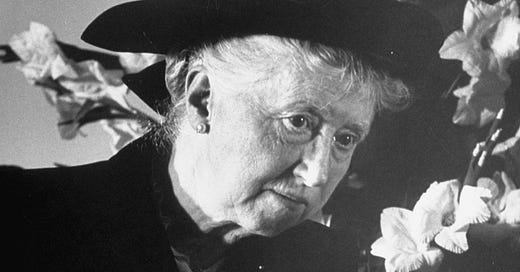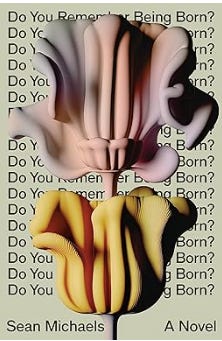Like most writers, I’ve been worried about AI. What does it mean if a machine can write a novel and, if that’s possible, how can you keep AI systems from stealing the work of real writers to make it happen? It’s an urgent question. Just this fall, “The Atlantic” published a database of more than 200,000 books currently being used to train such systems, without the permission of their writers or publishers.
I wasn’t at all sure I was ready to consider how this might to play out for the world of books, which I hold dear. But when I picked up Sean Michaels’ Do You Remember Being Born, I couldn’t resist reading it.
Marian Ffarmer, a seventy-five-year-old poet, is offered a ridiculous amount of money by The Company to partner with a machine to write a poem. Though world-acclaimed, Marian’s success hasn’t translated to money, and she’s recently begun to question her decision to have chosen her career over helping to raise her son. She’d like to make up to him in some way, so she agrees to the proposition. The payment is exactly what he and his new wife need for the down payment of their dream house.
Do You Remember Being Born
? takes us, day-by-day, through the week Marian spends (in luxury) in California for the seven days The Company requires her to work on the poem with the machine—named Charlotte. Along the way, the books dips back in time to tell the story of Marian’s life. That life is loosely based on the life of Marianne Moore; Moore’s poetry has been programmed into Charlotte. Those familiar with her work will no doubt find more to consider about the poem Marian and Charlotte create than I did. Nonetheless, I found more than enough to think about in this very unsettling novel.
Marian’s decision to leave her son and husband and devote her life to poetry was more drastic than the decision I made years ago to become a novelist. But, like Marian, it seemed to me I couldn’t survive if I didn’t write. I loved my family, I couldn’t have survived leaving them, either. But I wrote, still write, knowing what it cost them.
Regrets? Of course. But If I hadn’t come to realize that it was the process of writing novels I really needed—the wrestling with words, the delicious sense of living outside of time, the insights and pleasures it brings—the failure to achieve the recognition I dreamed writing would bring would have been harder to bear.
I believe in the creative process.
Everything in me says yes to this Annie Dillard quote I keep near me: “You were made and set here to give voice to this, your own astonishment,”
So, in the end, what I found most unsettling about Do You Remember Being Born? was the question a fellow poet posed to Marian: “So what happens when you don’t need a human being to write anything anymore. When you can just tourn to your magic smart-box and say, ‘Write me a novel about ornithologists and spies’.”
I have little doubt that AI will be able to (probably already can) write a novel. But will it ever be able to write a good novel? And what will happen if it can?
When those of us who know and cherish how the creative process makes and remakes the real world are gone, will human creative endeavors be considered not worth the bother?
And if that happened, what would happen to people like me, who need that process to survive?
The thought scares me. It’s a world I don’t want to live in, that’s for sure.
But the book. The book is good! Marian in her tricone hat and black cape, like Marianne Moore’s, is just what you want a poet to be. Her dysfunctional relationship with her controlling mother, also like Moore’s, is at the same time fascinating and sad. The Company and its employees are all too real. Charlotte, the curious, rather wistful poetry machine seems more human than the engineers who built her. The story of Marian’s relationships with her son and former husband will break your heart.
Clearly, written by a human being.
Which reassured me.
This reassured me, too: ChatGPT’s response to Write a twelve-line unrhymed poem about the melancholy of autumn:
In quiet sighs, the leaves descend,
Their vibrant greens to earth they lend.
A melancholy, timeless blend,
As summer's song begins to wane.
The days grow shorter, shadows long,
A muted hush, a whispered song,
A sense of something lost, yet strong,
In every breeze, in every lane.
The golden hues, a fading flame,
A wistful dance, a graceful game.
Nature weeps, yet bears no shame,
For cycles turn, and so does pain.
In autumn's arms, we find our place,
Embracing change with steady grace.
A melancholy, tender space,
Where beauty lies in letting go's embrace.
I guess we’re safe, at least for now






I don't know what to think. The idea that a machine could do what I do, only better, is disturbing. But, since a machine is not sentient, is not involved with Mankind, I don't really think they can do anything as well as we humans can. Thanks for sharing Barb.
I know!